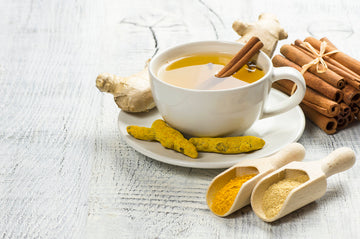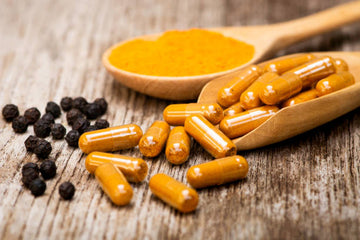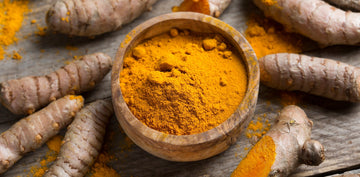Turmeric tea, often called "golden tea" or "golden milk," is a warm, soothing beverage that's not only delicious but also packed with health benefits. Made from turmeric, the bright yellow spice that's a staple in many kitchens, this tea is gaining popularity for its ability to boost well-being. Let's dive into the wonderful world of turmeric tea, explore its benefits, and learn how to make it at home.
Why you’ll love turmeric tea?
1. Fights inflammation
Turmeric’s superstar ingredient, curcumin, is a natural anti-inflammatory. Sipping on turmeric tea can help calm inflammation, making it a great choice if you’re dealing with joint pain or other inflammatory issues.
2. Loaded with antioxidants
Curcumin isn’t just an inflammation fighter—it’s also a powerful antioxidant. This means it helps protect your cells from damage and keeps you feeling vibrant and healthy.
3. Immune booster
Feeling a little run down? Turmeric tea can give your immune system the boost it needs to keep you healthy and fend off those pesky colds.
4. Soothes digestion
Turmeric can aid digestion and help alleviate bloating and gas. A cup of turmeric tea after a meal can keep your digestive system running smoothly.
5. Heart happy
Drinking turmeric tea regularly can be good for your heart. It helps improve blood vessel function and can even help lower cholesterol.
6. Joint comfort
If you’re dealing with arthritis or general joint discomfort, turmeric tea can be a comforting friend. Its anti-inflammatory properties can help ease pain and improve mobility.
7. Glowing skin
Turmeric is great for your skin. Its antioxidants can help clear up acne, eczema, and other skin issues, leaving you with a healthy glow.
8. Mood lifter
Turmeric might even help brighten your mood. Some studies suggest it can help with symptoms of depression and anxiety, making it a feel-good drink in more ways than one.
How to make turmeric tea?

Making turmeric tea at home is super easy and you can tweak it to your taste. Here’s a simple recipe to get you started:
Ingredients:
-
1 cup of water or milk (dairy or plant-based, like almond or coconut milk)
-
1 teaspoon of ground turmeric
-
1/2 teaspoon of ground ginger (optional, for extra zing)
-
1/2 teaspoon of cinnamon (optional, for warmth)
-
A pinch of black pepper (helps your body absorb the curcumin)
-
Honey or maple syrup, to taste (for sweetness)
Instructions:
-
Heat your water or milk in a small saucepan over medium heat.
-
Add the turmeric, and if you're using them, the ginger and cinnamon.
-
Stir well and let it simmer for about 5-10 minutes. This helps the flavors meld together.
-
Add the pinch of black pepper.
-
Strain the tea into your favorite mug.
-
Sweeten with honey or maple syrup to your liking.
Enjoy your warm, golden tea and feel good knowing you’re sipping on something that’s as beneficial as it is delicious!
Reference:
- Susan J Hewlings, Douglas S Kalman .(2017). Curcumin: A Review of Its’ Effects on Human Health
- C. David Mazer, MD, Gregory M.T. Hare, MD, PhD, Philip W. Connelly, PhD, Richard E. Gilbert, MBBS, PhD, Nadine Shehata, MD, MSc, Adrian Quan, MPhil, Hwee Teoh, PhD, Lawrence A. Leiter, MD, Bernard Zinman, MD, Peter Jüni, MD, Fei Zuo, MPH, Nikhil Mistry, MSc, Kevin E. Thorpe, MMath, Ronald M. Goldenberg, MD, Andrew T. Yan, MD, Kim A. Connelly, MBBS, PhD, and Subodh Verma, MD, PhD .(2019). Effect of Empagliflozin on Erythropoietin Levels, Iron Stores, and Red Blood Cell Morphology in Patients With Type 2 Diabetes Mellitus and Coronary Artery Disease
- Zerihun Yemataw, Kassahun Tesfaye, Awole Zeberga, Guy Blomme .(2016). Exploiting indigenous knowledge of subsistence farmers’ for the management and conservation of Enset (Ensete ventricosum (Welw.) Cheesman) (musaceae family) diversity on-farm
- Katherine HM Cox, Andrew Pipingas, and Andrew B Scholey .(2014). Investigation of the effects of solid lipid curcumin on cognition and mood in a healthy older population








